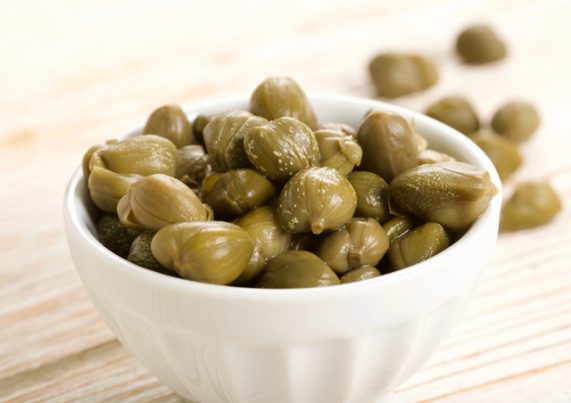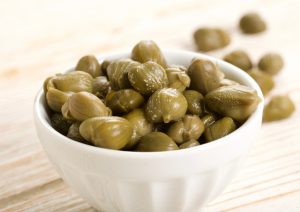
Capers – sources, health benefits, nutrients, uses and constituents at NaturalPedia.com
Wednesday, June 21, 2017 by Bridgette Wilcox
http://www.naturalpedia.com/capers-sources-health-benefits-nutrients-uses-and-constituents-at-naturalpedia-com.html

While capers are a familiar addition to salads and other dishes, where they come is a mystery to many people. In fact, the salty food item — often used as a flavoring agent — is a pickled version of the buds from the caper bush. According to HuffingtonPost.com, the flowers are picked from the bush long before flowering. They are sun-dried and then brined or packed in dry salt, giving them their distinct taste. Capers that have matured to a small fruit are called caper berries. These are also brined, and can be eaten or used the way olives are.
Commonly used in Mediterranean cuisine, capers are widely-grown in that region, as well as in nearby areas including north Africa, southern Europe, the Middle East, Asia, and Turkey. In the United States, capers are grown chiefly in California.
Harvesting capers can be tedious, as they are too small and fragile to be picked by anything else other than human hands. Because of this, capers can be expensive. They have an olive green color, are usually sold in jars or bottles, soaked in their brining liquid, or in vinegar. Capers in dry salt are harder to find, available only in specialty stores or by special order.
List of known nutrients
According to Nutrition-and-You.com:
- Calcium
- Copper
- Folates
- Iron
- Magnesium
- Manganese
- Niacin
- Pantothenic acid
- Phosphorus
- Potassium
- Pyridoxine
- Riboflavin
- Selenium
- Sodium
- Thiamin
- Vitamin A
- Vitamin B2
- Vitamin C
- Vitamin E
- Vitamin K
- Zinc
Medicinal uses for capers
Capers been used for medical reasons since ancient times, according to StyleCraze.com. It has been used by ancient Greeks for rheumatism relief. It is also known for providing relief for stomach problems such as flatulence. As a rich source of fiber, capers can also reduce constipation.
Capers are high in rutin and quercetin, flavonoid compounds that contain antioxidants, which combat free radical damage, thereby slowing down the aging process and preventing cancer and other harmful diseases. In particular, quercetin boasts analgesic, anti-inflammatory, and antibacterial properties that can help treat or provide relief for a number of health conditions.
At the same time, rutin aids blood circulation and helps treat strained blood vessels, making capers beneficial for heart health. Capers also contain niacin, which is known to protect against cardiovascular disease.
Capers are also good for the hair and skin. Rich in vitamin B and iron, they promote hair growth. They have also been used to treat skin conditions such as redness, irritation, and acne, due to their antioxidant content.
They can also help improve eyesight, due to a good vitamin A content. Vitamin A also supports the immune system and helps fight infections.
With a generous amount of riboflavin, capers also provides an energy boost. Vitamin B2 also supports the nervous system, and promotes adrenal function.
Capers may also be efficient against:
- Cough
- Diarrhea
- Gout
For all their health benefits, capers also have a high sodium content, so they should be eaten in moderation, and avoided by those who are on a low sodium diet.
Body systems supported by capers
Here are the body systems that benefit from capers, according to HealthBenefitsTimes.com:
- Digestive system
- Endocrine glands
- Eyesight
- Immune system
- Nervous system
- Skin and hair
Ways to use capers
The distinct salty-sour taste of capers is a great accent to a range of flavors, making capers a welcome addition to most dishes. According to FoodRepublic.com, capers work particularly well in salads, pastas, burgers, and pan-cooked dishes. They are typically added to popular Italian dishes such as chicken piccata and eggplant caponata, and go well with tomato sauce-based recipes. Their strong flavor means that a small sprinkle of capers on the dish is enough — too much of it may overpower the flavors of your meal.
Where to learn more
- Antioxidant-Rich Capers Could Protect Consumers from Cancer Effects of Meat Consumption
- 11 Delicious Key Ingredients that Make The Mediterranean Diet So Nutritious
- 5 Simple Recipes Rich in Magnesium
- 10 Foods That Boost Your Focus and Memory
- 10 Raw Vegan Thanksgiving Dinner Recipes
Summary
Capers can be used to treat rheumatism.
They benefit the digestive system, providing relief for flatulence and constipation.
Capers contain antioxidants that can help prevent cancer, heart disease, and premature aging.
They promote hair growth, and improve the skin by treating redness, irritation, and acne.
Capers can also improve eyesight.
They have properties that can boost the immune system, nervous system, and adrenal system.
The high sodium content means they must be eaten in moderation.
Sources include:
HuffingtonPost.com
Nutrition-and-You.com
HealthBenefitsTimes.com
StyleCraze.com
FoodRepublic.com
Tagged Under: Tags: capers






